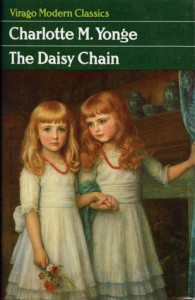I tackled this in my usual Victorian novel method – 2% a day. However, I found it quite compelling and foccussed solely on reading this for a while.
Here is the description …
The Daisy Chain “Charlotte Mary Yonge’s Victorian bestseller is a domestic story, a novel of female education, and a detailed survey of the controversies and practices of High Church Anglicanism in the 19th century. Its portrayal of the bookish, awkward heroine, Ethel May, paved the way for stories of literary heroines like Jo March and Anne Shirley, and its emphasis on the domestic life of the May family illuminates the Victorian doctrine of separate spheres, the seemingly contradictory gender politics of the Woman Question, and the relationship between religion and the rights of women in the 19th century. Absorbing, moving, and intricately plotted, The Daisy Chain is Yonge’s best-known novel; this edition will provide the 21st century reader with a comprehensive education in Victorian culture, not to mention a tremendously satisfying reading experience.” – Kelly Hager, Simmons College.
Although each part of this novel is easy to read, it is long – Bleak House long if you know what I mean and found myself wishing there was fewer daisies! To be honest I think this novel will now (I can’t believe how popular Miss Yonge was in her time) only appeal to die hard Victorian fans – it is very religious and very didactic. The characters spent an inordinate amount of time analysing their motives, thinking of their behaviour and trying to be better people. There is no plot as such it is as the title states ‘a family chronicle’. Events happen some dramatic some not, the characters react, and then the characters study their reactions and determine to be better.
At about 70% (I was reading it on my Kindle) I ran out of steam. I pitied poor Ethel who seemed the one sacrificed to look after the father (obviously she had made peace with this through much prayer and thought it her duty and a duty accepted gladly always brings contentment), and poor Flora who has something awful happen (don’t want to give away the plot) and then is told it might be the best thing to happen because it will bring you back to god – I wanted to give up then, but pushed on to the end.
From a social history point of view this is an interesting novel to read – Miss Yonge was immensely popular in her time and was compared to Austen, Trollope and Eliot. I can only assume people thought much more about their soles then than now. To me it read like a very long Sunday School story.

